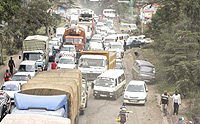So, here I am in Nairobi once again. It’s sprouting early Monday morning of June 1. The sun is rising eastward along the equator. Cool, lasting mists peel slowly but the ‘rush hour’ is already on, and the streets are so chaotic.


So, here I am in Nairobi once again. It’s sprouting early Monday morning of June 1. The sun is rising eastward along the equator. Cool, lasting mists peel slowly but the ‘rush hour’ is already on, and the streets are so chaotic.
Everything about living in this country is still strange and a little frustrating, especially to a foreigner from an orderly country like Rwanda.
A huge throng are commuting all the way to their respective destinations. Vendors too contribute to the already distressing jam, selling news papers and magazines.
In other words, the capital city, probably like other cities in the country is busy ‘24 hours’, as people move according to Herbert Spencer’s common phrase: "Survival for the fittest.”
In this country, people literally jostle, and dragging feet is not a common word in their vocabularies. Somehow, in this commotion of humanity, I find myself comfortable in Silver Springs Hotel, one of Nairobi’s 3 star hotels, where I stayed for a week.
In many ways, the Kenya I was living in is exactly the Kenya I had imagined. Every morning I peeped through my hotel window, I would see all the bright cheerful colours just as I had pictured Nairobi.
Women and men on their way to the market balancing all sorts of goods on their heads.
From Machako, the nerve centre of Kenya’s public-transport system buses and mini-buses return from the remotest corners of the country, and probably beyond.
Everything is in a hurry! Buses and mini-buses don’t wait for passengers, but instead the other way round. It’s probably ideal for one to first undergo a commando course in order to cope with the policy of these buses.
I boarded an old bus called KCB to take me into the city centre. It was carrying many people with their luggage, and my knees almost knocked out my teeth, I braced myself for the jammed road to my destination.
The roads are huge enough, but still vehicles use the pavements, creating high risks of road accidents. All the way down, passengers are treated to hour after hour of daring, as one is expected to jump off the bus or mini-bus when it’s still moving.
This followed the guffaws of laughter. People in the bus, which Kenyans call the "Citi Hoppa” when I almost screamed my lungs out: "Please wait I wait to alight!” They wondered what the hell I was scared of.
Since then, I made an oath to myself never to board public transport as long as I was still in this country, or my beloved would now be singing a funeral song.
For some strange reasons, foreigners in Kenya are advised never to ask for directions from anyone, or else they get robbed.
As I roll down into the city, Kenyan music blares cheerily from the shops, and I spend a couple of hours threading my way along to Ngari, one of Nairobi’s suburbs.
The next day, my friends and I hired a cab to take us to the city for shopping, and to visit the city. The jam was at its worst, and we peeled ourselves off the seats, while waiting for it to reduce. It was too sunny, and the streets were dusty with hurried throngs and pedestrians.
Businesses entirely operate on weekends too. Bars, restaurants and nightspots are extremely busy throughout the week. The welcoming hospitality in Kenya is doubtful, and one is advised to be extremely careful because of the alarming theft rate, especially in Nairobi.
Ends


